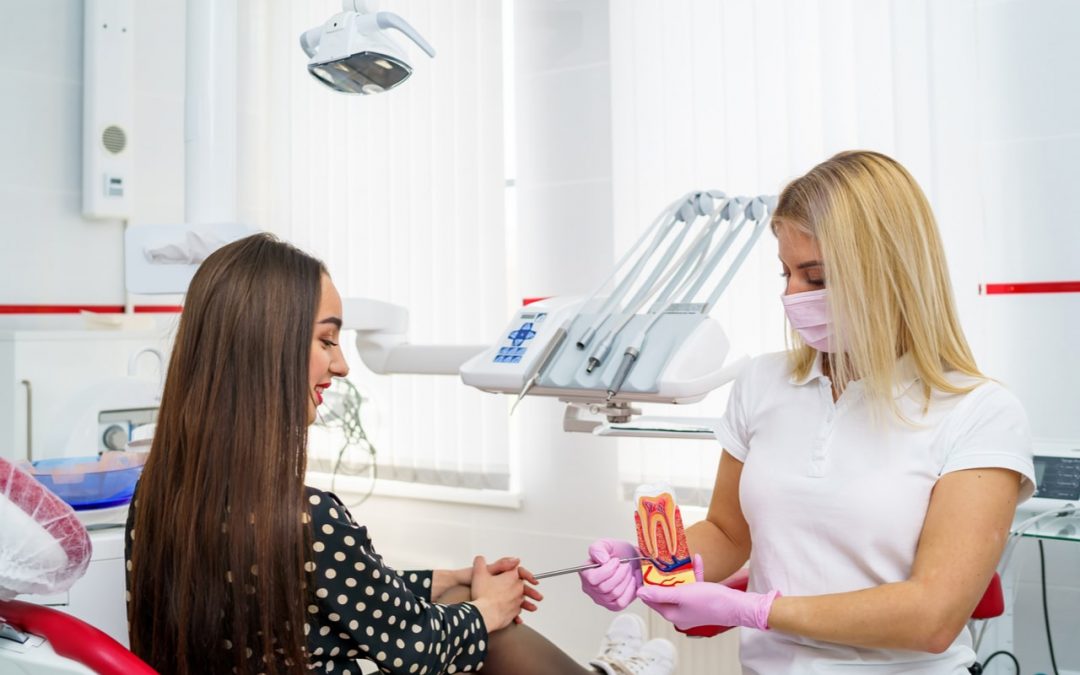A patient with sudden tooth pain can call an emergency dentist immediately. So, these incidents need quick solutions to prevent gum disease. Procedures in a dental office may take either short or long hours, depending on the process complexity. As part of aiding the dentist or surgeon, patients may receive sedation or anesthesia especially for surgeries like dental implants. Afterwards, the patient may expect to feel sudden numbness in the cheeks and gums. Many individuals may feel alarmed and ask how do you make numbness from the dentist go away faster? If you’re one of these people who want to eat and chew properly again, read our tips ahead.
Why Do My Teeth Feel Numb After Dental Work?
Going to a dentist’s clinic is an excellent response to combat bacteria from cavities and plaque. In any scheduled appointment, a dentist or a hygienist will disclose all the necessary steps to restore teeth. Several oral healthcare treatments may need a numbing product to help in completing the process faster. However, the numbness may not be easy to get rid of. The sensation of experiencing numbness comes from the chemicals in the drug that blocks the signal of pain going to the brain. Hence, patients with sedation or anesthesia quickly feel numb around the lip, mouth, tongue, or adjacent nerve. It is not the teeth that become numb per se, but the nerves surrounding the gums and tooth.
Other Side Effects Of Anesthesia Or Sedation
Numerous dental clinics may use brands similar to Lidocaine or Novocaine, which are local anesthesia medicines. Aside from feeling numb, patients who just had their teeth extraction or dental implants may feel other side effects from a sedative. Don’t forget to ask your dentist or anesthesiologist about the side effects. These details may allow you to prepare during your recovery after a root canal therapy or extraction.
- Nausea And Vomiting
- Migraines And Headaches
- Feeling Lethargic
- Allergic Reaction
- Irregular Heartbeat
- Difficulty In Breathing
Reasons For Using Local Anesthesia In Dentistry
 A dental clinic should also be responsible for providing the best quality service. Ranging from surgical to non-invasive procedures, dentistry aims to care and maintain a person’s teeth, gums, and mouth. Pain is a factor that scares patients during dental treatments. That said, sedation is a quick way to decrease pain from any surgical or invasive procedure. Moreover, children have the highest probability of gaining dental anxiety that prevents their mouth work. A child must need a numbing anesthetic to decrease the pain that can lead to gag reflex or an accident. Parents must encourage their kids to go to a dentist since anesthesia is only used for a short period.
A dental clinic should also be responsible for providing the best quality service. Ranging from surgical to non-invasive procedures, dentistry aims to care and maintain a person’s teeth, gums, and mouth. Pain is a factor that scares patients during dental treatments. That said, sedation is a quick way to decrease pain from any surgical or invasive procedure. Moreover, children have the highest probability of gaining dental anxiety that prevents their mouth work. A child must need a numbing anesthetic to decrease the pain that can lead to gag reflex or an accident. Parents must encourage their kids to go to a dentist since anesthesia is only used for a short period.
Are There Risks For Anesthesia Use?
The first thing your dentist or surgeon does after surgery is to revert the effects of anesthesia. Your anesthesiologist may inject a reversal medicine to counter the sedative. However, some side effects of anesthesia during any procedure may be risky for patients with underlying medical conditions. Some patients with higher chances of hazards are:
- People with heart disease or stroke history
A person with a heart complication may be at risk of getting a stroke or heart attack from a Novocaine or lidocaine. Elderly patients may experience stress from the procedure, which can increase high blood pressure in the heart or brain.
- Treatment for patients with HIV/AIDS
Notably, people with HIV or AIDS may transmit their diseases to the practitioner.
- Seizures and CNS (Central Nervous System) disorders
Disorders in the central nervous system, particularly for people with seizures can be a cause of death. Thus, a professional surgeon must be aware of these health risks.
- Sleep Apnea and breathing problems
Diabetes and obesity can also be a risk factor since being overweight can affect sleep apnea and breathing problems. It may be harder for people with sleep apnea to stop being unconscious or decrease the numbness due to the airway’s contraction for the oxygen needed by the body. Disclose any medical history problems during your initial consultation so that your doctor or dentist can prepare for this problem.
How To Relieve Numbness After A Dental Procedure
A few hours of experiencing numbness after your dentist’s procedure may worry most patients. Is there a way on how to decrease the numbness? There are both inpatient and outpatient solutions for faster relief. Home remedies may give answers for comfort, yet a professional surgeon should instruct proper ways to get rid of numbness. Here are four tips that we can suggest on how do you make numbness from the dentist go away faster.
Sleep And Rest
Local anesthesia isn’t as strong as general anesthesia, in which surgeons apply for a long active hour of treatments. Hence, a person may be free to sleep and rest after the same-day release for treating a dental disease.
Gently Massage Your Skin
Massage and relaxation after surgery are ideal for getting rid of numbness. Also, continuous blood flow is suitable for proper healing. On the contrary, don’t force yourself to touch the area of the surgery. It helps to have a reflexologist or a masseuse to get rid and wear off that numb feeling.
Ask For Reversal Injection
 A fast way to relieve your numbness after the dentist’s operation is to ask for the reversal drug to counter the effect of anesthesia or sedation. Like IV or laughing gas, many types of anesthesia may require dentists to apply reverse medications like oraverse. That said, an injection may cost out-of-pocket money and has no health insurance coverage since it is not medically needed.
A fast way to relieve your numbness after the dentist’s operation is to ask for the reversal drug to counter the effect of anesthesia or sedation. Like IV or laughing gas, many types of anesthesia may require dentists to apply reverse medications like oraverse. That said, an injection may cost out-of-pocket money and has no health insurance coverage since it is not medically needed.
Contact Your Dental Clinic
Numbness may wear off after a few hours or days of the procedure. However, if you keep seeing symptoms of swelling or redness on your lips, call your dental clinic right away. It is rare to have allergic reactions from anesthesia, but unexpected cases are possible.




